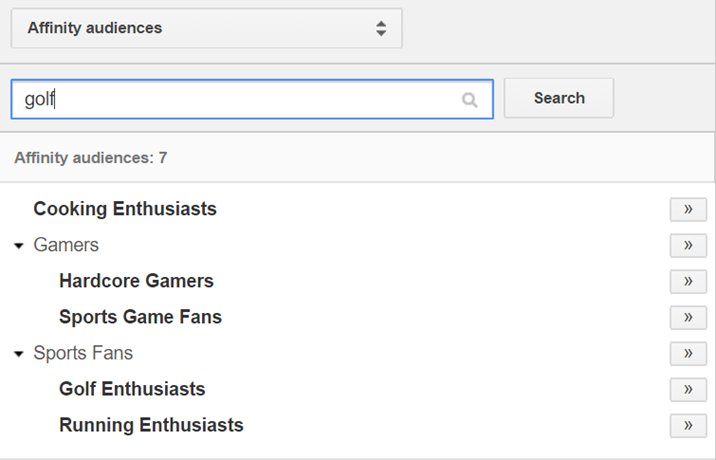4 Custom Affinity Audiences To Try For Display Advertising

For the sake of this post, let’s pretend I own a new company that develops and sells golf clubs. As a new company in a competitive market, I strongly feel the need to invest in Display advertising in AdWords to build awareness. People aren’t going to search for my company’s products if they don’t know they exist. I’ve tried keyword and interest targeting, but most of the suggestions were too broad. Next, I looked at affinity audiences which are closely related to “TV-style” demographics. When I searched for “golf,” here are the options AdWords gave me for affinity audiences.

Look it up yourself. Those really are the results in AdWords. The only audience remotely close to what I’d want would be “Golf Enthusiasts.” Even this particular audience is pretty broad. I have no idea what requirements make up a golf enthusiast in Google’s eyes. If I have the budget to reach a wider, broad audience, I’d test out an affinity audience. However, I want my targeting to be as precise as possible. I’d rather create custom affinity audiences to not only save budget but reach a more relevant audience. Here are four custom affinity audiences you might want to consider creating for your Display campaigns.
Competitor Names And URLs
Pretty straight forward. Gather a list of all of your competitors’ names, URLs, and potentially branded products to create a new affinity audience. Depending on how big each of your competitors’ brand recognition is, you may want to consider creating a new custom affinity audience for each competitor.

I need to make it clear this is not a remarketing list created from visits to your competitors’ sites. That does not exist. We’re merely creating interest audiences based on competitor keywords and URLs. I’ve found this audience to be effective for many of my Display campaigns, especially when I can’t target their sites via exact placements.
Industry Publications
There is a good chance your target audience reads some sort of newspaper or magazine (online or print) related to your products and services. Test adding a list of relevant publication keywords and URLs as another custom affinity audience. This strategy can also be applied to any other educational source within your industry.

If you are B2B, add all of the publications closely associated with your service categories. If you are ecommerce, you may have more leeway to test other publications outside your industry if you feel your target audience is interested in those magazines. This custom audience may require more testing, but can lead to a new way to reach new customers.
Industry Trade Shows Or Conventions
Trade shows, conventions or even conferences are another must-try custom affinity audience. Users interested in these events are most likely bigger fanatics of your products and services over most people. If they pay a fee just to enter a building to look at product which suits their interests, they are relevant. And I want to try and get in front of those users.

In the golf industry, I might consider creating a few custom affinity audiences. First, I’d create a list of trade shows the consumer would be interested in attending. These are the end-users who will hopefully be using your products. Second, if applicable, I’d also create a list of trade shows tailored to the retailers who may eventually supply my product to the end user. Every industry will have different groups of trade shows, conventions, conferences, etc. Consider testing each group to see which event audience makes the biggest impact for your business.
User Behavior Related To Your Product Or Service
In the scenario of owning a golf club company, I want to reach the users who are going to use my product. Whenever I can, I try to create a custom affinity audience based on the behaviors users are involved with when using my products. Here’s a simple example.

This target audience will give me a better shot of getting in front of a more active user than just targeting “golf enthusiasts.” Users who are looking to fix their swing don’t just watch golf. They play golf. With clubs. Clubs they hopefully will buy from me. While there’s no guarantee this interest audience will only reach consumers, at least I know I have a better shot going this route over the basic affinity audience.
Final Point
If you have the budget to advertise to a wide variety of people, you might be okay with basic affinity audiences in AdWords. Personally, whether my clients have large budgets or not, I still like to test out custom affinity audiences to make sure I’m giving the best performing audiences the proper budgets. Start out as specific as possible to the right audience. Then expand upon the reach if you’re not meeting your awareness goals. These are just four examples of what you can do with custom affinity audiences in AdWords. Learn more about your target audiences and understand their interests and behaviors. You’ll most likely find additional options for custom audiences we didn’t talk about today.



